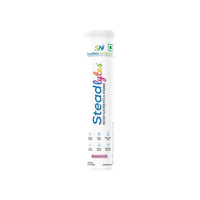Electrolytes are minerals with an electric charge. They are necessary to maintain proper functioning of certain biochemical processes, nerve transmission, muscles contraction, maintain blood pressure and many more. In this article, we will discuss why maintaining an electrolytic balance of the body is essential for athletes and active people.
When it comes to nutrition guidelines of athletes, adequate fluid intake is also recommended along with other macro and micro-nutrients. For athletes, both dehydration and overhydration are risky. On one hand, dehydration can lead to muscle cramps and affect cognitive performance, whereas over-hydration can increase the risk of hyponatremia or low sodium levels in the blood. It is well-established that physical activity results in a loss of electrolytes due to excessive sweating. It affects the body adversely due to fluctuations in core body temperature, heart rate with an increased risk of heatstroke, acute kidney failure, muscle twitching and cramps. Apart from sweating, outdoor environmental conditions, temperature, humidity also plays a significant role in fluid loss. Therefore, it is necessary to consume adequate fluid at every stage - pre, during and post-training or competition.
Sports or electrolyte drinks are popular among active people. They are a great and convenient way to maintain the electrolytic balance of the body. Athletes are usually advised to check their weight before and after competition to understand an approximate estimate of fluid loss, which can be utilised to replenish lost electrolytes and fluid balance of the body.
Here are some of the electrolytes which are essentially required and their depletion might affect hydration levels, acid-alkaline balance of the body and other organs.
1. Sodium - Sodium is one of the important minerals which is required by our kidneys to determine how much fluid should be retained or excreted out of the body. It is not only important for nerve function but also regulates our blood pressure and muscle contraction. Excess of sodium or sodium-rich diets is also a big no-no, as they contribute to causing hypertension. High sodium also affects potassium levels in the body.
2. Potassium - Potassium is also needed for nerve transmission and muscle contraction. It is also needed for the rhythmic contraction of our heart. Loss of potassium might result in nausea, vomiting, muscle cramps, spasms and increased heart rate. Similarly, excess potassium consumption can also lead to abdominal discomfort.
3. Phosphorus - Phosphorus is needed for energy metabolism and the production of ATP. Restoring the levels of phosphorus is necessary for the growth and maintenance of tissues, nerve transmission and bone strength. Though phosphorus is needed for the mineralisation of bones excess phosphorus might result in calcium imbalance, leading to bone loss.
4. Magnesium - As it is widely known that magnesium is required for approx. 300 biochemical processes in our body. Magnesium loss during strenuous activity can contribute to muscle cramps, fatigue, altered enzymatic activity and mood swings. Among females, low magnesium levels can also worsen the symptoms of PMS. It can also cause sleep disturbances which can adversely affect the recovery of athletes.
5. Chloride - This mineral is critical as it helps regulate the movement of fluid across the cells and maintains the pH balance of the body. Lack of chloride not only affects muscle contractions but can also prove harmful for our joints and tendons. Appropriate levels of chloride as sodium chloride aids in regulating aldosterone hormone and conserve electrolyte levels.
6. Calcium - Calcium’s role in maintaining bone and dental health is undeniable. It is required for energy metabolism, signal transmission, muscle contraction and regulates heartbeat. Therefore, it is essential to replenish the lost stores of calcium as poor bone health might prevent an athlete from giving his/her best. Additionally, endurance athletes are more prone to injuries, falls and wounds. Calcium plays a cofactor during the blood clotting process. Hence depleted levels of calcium can also delay wound healing.
To conclude, it is clearly evident that electrolytes play a crucial role in determining the athletic performance of athletes. Be it an endurance athlete or a gym person, any imbalance can lead to detrimental effects on his/her health. Consuming plenty of fruits and vegetables in the diet is a good way to provide all the required minerals. Beverages like water, coconut water, birch water, buttermilk, fruit juices, smoothies also help in maintaining the fluid and electrolyte balance of the body. During competitions or strenuous training days, opt for sports and electrolyte drinks as they are specifically designed to meet the need of the hour. Adopt the habit of hydrate during exercise as it helps maintain balance and also enhances the body’s tolerance to digest.



